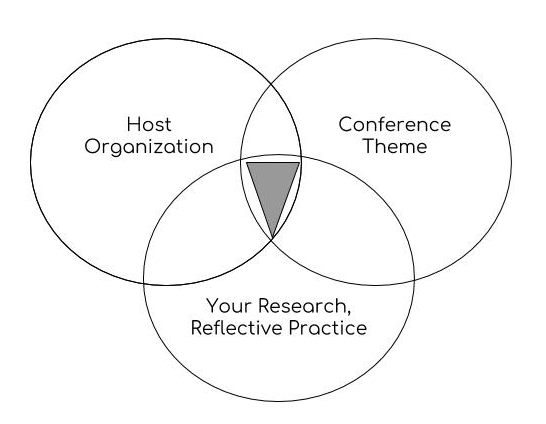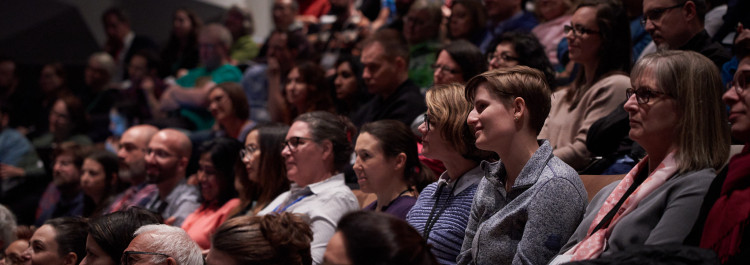How does one go about deciding on a topic for a workshop proposal?
Three college teachers are in an office talking about presenting workshops at conferences. I have been asked to present a session on “pedagogie numérique” in English at the AQPC this June. I am excited, although I had to check the definition to make sure that the term meant what I thought it did: basically, the use of technology to support teaching and learning. The youngest teacher, who is giving courses on human biology and nutrition this term, tells me she feels nervous on my behalf; she is comfortable in front of a classroom full of students, but the idea of standing in front of peers doesn’t appeal to her. “I enjoy preparing and facilitating workshops,” I tell her. My other colleague, also a biology teacher, laughs and tells the story of the time, many years ago, when we attended a workshop where the presenter cancelled due to a family emergency. The conference organizer arrived breathless to apologize to the waiting audience, and I (in hindsight rather presumptuously) offered to give our workshop on a related topic rather than leave everyone with an empty workshop slot. I had our presentation on a USB key, and one of the other two presenters was there with me. We were ready to present because our workshop was scheduled for later that day. Those who wanted to could leave, but at least we could use our time talking about pedagogy. Most of the attendees stayed and what followed was a lively, spontaneous exchange about pedagogy in higher education. We ended up presenting that workshop more than twice; it was chosen as the winner of the 2009 AQPC workshop award, which gave us funding for a presentation of the workshop ,”Ten Concrete Classroom Activities that Aim at Long-Term Learning,” at an international conference.
Back to the three teachers in the office… my colleague who, like me, has more than a quarter century of college teaching experience, laughingly tells our younger colleague that she is not worried about me at all. Then the conversation focuses on the newer teacher, we tell her she should think about presenting. Her fellow science teacher reminds her of the rich knowledge and experience she has teaching indigenous students and working with the Innu community. “People think they don’t have anything to share,” I explain, “but it is not a question of knowing more than your peers; a workshop provides an opportunity to share your unique experience in a way that others might find interesting, useful, or inspiring.” As we continue talking it becomes clear that the younger teacher has a wealth of individual knowledge that would be incredibly interesting and helpful to teachers in regions that serve our indigenous students, and also be useful to teachers in the larger urban centres who, whether or not they teach indigenous students, are open to learning more about reconciliation and decolonization, and thinking about how that plays out in the classroom. I think most teachers have some specific experience to share: a novel approach they have found for a tricky teaching challenge, an insight into their program, or an approach to teaching their discipline that others could benefit from. Conferences provide a place for us to come together and learn from each other.
If you decide you would like to propose a workshop for a conference about teaching and learning, here are some things to consider while choosing a topic for your presentation:
- Who is putting on the conference?
- What is the theme of the conference?
- How does your specific knowledge, experience and/or research intersect with the two previous points?
- Which of the available presentation formats works best for your idea?
Begin by researching the association or group that is putting on the conference. Different conferences have different cultures and objectives. If you understand the group’s mandate you have a better idea of the kinds of presentations the attendees will be hoping for. Most pedagogical conferences look for sessions that explore research-based practices, but some conferences focus more on presentations of academic research projects, while others have a higher percentage of practice-based research. To say it another way, some conferences draw presenters and participants from masters and doctoral students and researchers who share their findings for both practical and academic purposes, while other conferences cater more towards teaching practitioners who are looking for hands-on solutions to current problems. Besides the group organizing the conference, most conferences move from one geographical location to another each year, and are hosted by one or more academic institutions and their surrounding town or city, and this also adds specific flavours to the conference that you might want to keep in mind. Some examples of groups that organize conferences include:
| Organization | Mandate | Target Population |
|---|---|---|
| SALTISE (Quebec) |
supports active learning & technological innovation in studies of education |
educators (researchers and practitioners) and professional development personnel |
| AQPC (Quebec) |
encourages pedagogical progress for college teachers | teachers, professional staff such as pedagogical advisors, and administrators |
| STLHE (Canada) |
supports and shares research and practices surrounding scholarly teaching and learning |
educators, researchers, students, administration, policy makers |
| COIL (Global, affiliated with the State University of New York) |
supports collaborative online international, cross-cultural learning |
researchers, teachers (reflective practitioners), students (student perspectives) |
| RASCALS (Quebec) |
provides a forum for English second-language teachers to share hands-on practical teaching techniques and activities |
college level ESL teachers |
The table above does not aim to furnish an exhaustive list, instead I hope it can give you a quick indication as to how the group that is organizing a conference has an impact on the collection of people who will gather there and the kinds of workshops that will work well for them.
Once you have chosen the conference you want to propose a workshop for, you will want to understand the theme of the conference. Usually the theme is released months before you need to hand in your workshop proposal, so take the time to read the explanation provided. This lets you know what the organizers are hoping to explore and why they chose that idea. To give you a sense of what some specific themes might look like, here is a list from previous SALTISE conferences:
- 2017, New Frontiers for Engaging the Learner: Interconnecting design and assessment
- 2016, Designing Instruction for Learning: Blending pedagogy, technology and space
- 2015, Inspiring Change, Leveraging Evidence: New models of designing instruction
- 2014, Bridging Knowing How with Knowing Why: Scaling the ladder of practical knowledge and pedagogical theory
- 2013, Pedagogical Change in Higher Education: Building new models of learning and teaching
Once you have a clear sense of the conference theme you can start thinking about your teaching practice and how it might connect with the given theme.
How does your knowledge, experience and/or research intersect with the conference population and goals, as well as the theme of that conference. Like so many ideas, this is easier if you visualize it as a Venn diagram:

When you are presenting your research it might seem as if there is no choice involved, you will simply disseminate your findings. But even this seemingly straightforward situation demands that you make decisions. The time-frame is limited; you may have twenty minutes, or you may have an hour. You will not be able to share everything you have done over the hours, weeks, years and pages you have dedicated to this subject. Use your Venn diagram to help you decide what might be the best part to focus on. If your listeners are fellow researchers your methodology may be the most salient feature to share, but if you are addressing a group of classroom teachers who have no intention to undertake an academic research project then you will probably want to focus on your results and their possible applications in a classroom environment. If you are a classroom teacher who intends to share what you have learned in your reflective practice, remember you can come at this from a variety of angles: consider discipline specific aspects, delve into pedagogical practices, or reflect on new technological opportunities that have modified the way your students interact with the material and each other.
Now that you have narrowed down your topic you will need to think about which of the available presentation formats works best for your idea. Read the call for proposals closely and think about which format fits you and your topic. Consider the presentation types available for this year’s SALTISE conference:
- Individual talks (15 minutes)
- Interactive presentations (5 minutes individual – 35 minute gallery walk – 15 minute discussion)
- Panel sessions (4-8 presenters talking on a topic; 75 minutes total)
- Symposia (75 minutes total, 3-4 presentations organized around a single topic -not workshops)
- Posters sessions (60 minutes, during lunch break)
- Doctoral lunch (60 minutes, during lunch break)
- Post conference workshops (half day or full day)
The AQPC has only three formats for this year’s conference (75 minutes each):
- Active workshop – participants are encouraged to participate
- Presentation with exchanges- talk followed by a discussion
- Forum – an animator orchestrates a discussion among participants
Once you have chosen your topic and decided on a format you will need to fill in the form available on the conference site; look for “call for proposals” on the menu bar. You usually need to write two short texts, one that describes your workshop idea to the selection committee (about 500 words) and another shorter version that will be published in the conference program (about 300 words). After that you get to sit back and wait for a few months to see if your proposal is accepted.
If it is accepted you need to start preparing your workshop, and I intend explore some ideas about that in my next post!



